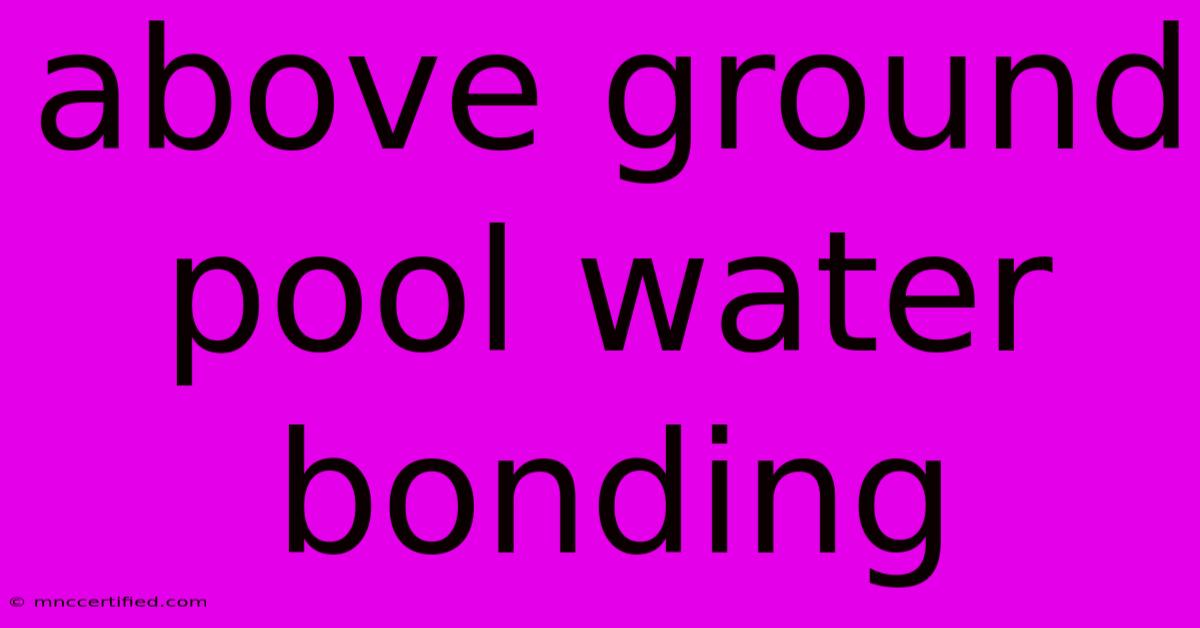Above Ground Pool Water Bonding

Table of Contents
Above Ground Pool Water Bonding: Ensuring Safety and Compliance
Above ground pools offer refreshing escapes during the summer months, but ensuring the safety of swimmers is paramount. A crucial aspect of pool safety often overlooked is water bonding. This article dives deep into the importance of above ground pool water bonding, explaining what it is, why it's necessary, and how to achieve proper bonding for your pool. We'll also address common misconceptions and provide helpful tips for maintaining a safe swimming environment.
What is Above Ground Pool Water Bonding?
Water bonding, also known as electrical bonding, is a crucial safety measure designed to prevent electrical shock hazards around your above ground pool. It involves connecting all metallic components within and around the pool to create a single, equipotential plane. This means that all the metal parts are at the same electrical potential, eliminating voltage differences that could cause a dangerous shock if someone were to touch two different metallic parts simultaneously.
Think of it like this: if a fault occurs in an underwater light or pump motor, the bonded system redirects the stray current to the earth ground, preventing it from traveling through the water and shocking a swimmer. Without bonding, this stray current could flow through the water, making it potentially lethal.
Key Components for Bonding:
- Pool Shell: The metal parts of the pool structure itself.
- Pool Equipment: This includes pumps, filters, heaters, and underwater lights.
- Metallic Accessories: Ladders, handrails, diving boards (if applicable), and other metallic fixtures near the pool.
- Grounding Rod: A conductive rod driven into the earth, providing a path for fault currents to safely dissipate.
Why is Water Bonding Necessary for Above Ground Pools?
The National Electrical Code (NEC) mandates electrical bonding for above ground pools to ensure swimmer safety. Failure to comply can result in serious injury or even death, as well as potential legal repercussions. The risks are significant, especially given the presence of electricity-powered equipment like pumps and lights near water.
Here's why bonding is vital:
- Shock Prevention: The primary reason is to prevent electric shocks from faulty equipment.
- Safety Compliance: It's a legal requirement and ensures you meet safety standards.
- Peace of Mind: Knowing your pool is electrically safe provides peace of mind for you and your family.
- Insurance Requirements: Many homeowner's insurance policies require proper bonding for pool liability coverage.
How to Achieve Proper Above Ground Pool Water Bonding:
Proper bonding requires a methodical approach and often involves a qualified electrician. While some aspects might be DIY-friendly, it's crucial to understand the limitations and safety implications.
Steps Involved (Consult a professional for complex installations):
- Identify All Metallic Components: Make a complete list of all metal parts within and around the pool.
- Use Proper Bonding Wires: Use appropriately sized copper bonding wires, typically 6 AWG or larger, and ensure they're corrosion-resistant.
- Secure Connections: All connections should be made using appropriate clamps or connectors that ensure a robust and lasting bond. Never rely on simple wire twisting.
- Grounding Rod Installation: A grounding rod should be driven deep into the earth, away from the pool, and properly connected to the bonding system.
- Verification Testing: After installation, a qualified electrician should test the bonding system to ensure it meets safety standards. This typically involves measuring the resistance of the bonding path to ground.
Important Note: Improperly installed bonding can be just as dangerous as no bonding at all. If you're uncertain about any aspect of the installation process, always consult a licensed electrician.
Common Misconceptions About Above Ground Pool Water Bonding:
- Myth: The pool's metal shell is sufficient for bonding. Fact: The shell needs to be bonded to all other metallic components to create a complete equipotential plane.
- Myth: GFCI breakers alone are enough. Fact: GFCI breakers protect against shocks, but bonding is a critical supplemental measure.
- Myth: DIY is always sufficient. Fact: While some aspects might seem simple, incorrect bonding can be hazardous. Professional installation is highly recommended.
Maintaining Your Pool's Bonding System:
Regular inspection is crucial to ensure the bonding system's integrity. Check for corrosion, loose connections, or damaged wires periodically. Addressing any issues promptly prevents future hazards. Consider having a professional electrician inspect the system annually.
By prioritizing above ground pool water bonding, you ensure a safe and enjoyable swimming experience for everyone. Remember, safety should never be compromised; consult professionals when necessary and always comply with local electrical codes and regulations. A safe pool is a happy pool!

Thank you for visiting our website wich cover about Above Ground Pool Water Bonding. We hope the information provided has been useful to you. Feel free to contact us if you have any questions or need further assistance. See you next time and dont miss to bookmark.
Featured Posts
-
Bonding Insurance For Nonprofit
Nov 23, 2024
-
Wicked Movie Vs Broadway Key Differences
Nov 23, 2024
-
London Embassy Controlled Explosion
Nov 23, 2024
-
How To Cancel Auto Renew On Mtn
Nov 23, 2024
-
Hello Mobile Unlimited Data Cap
Nov 23, 2024